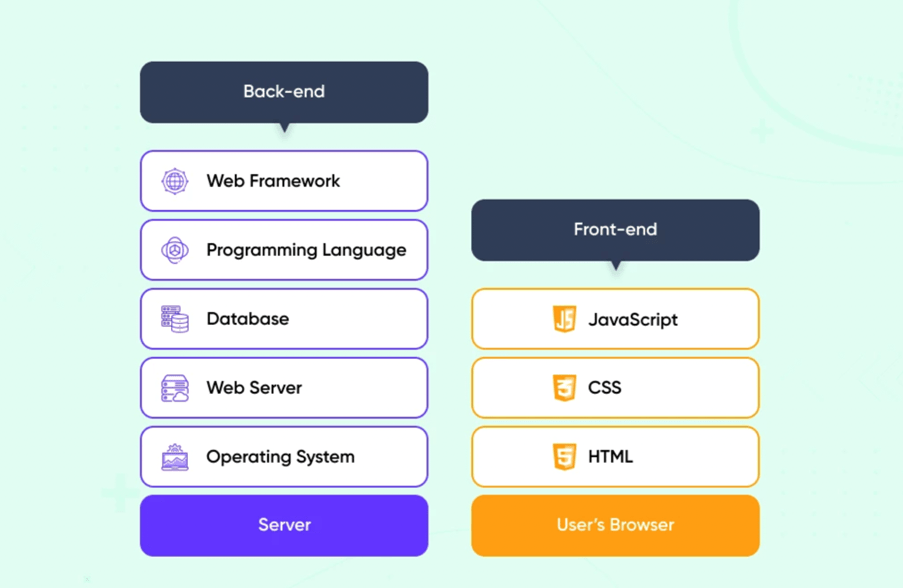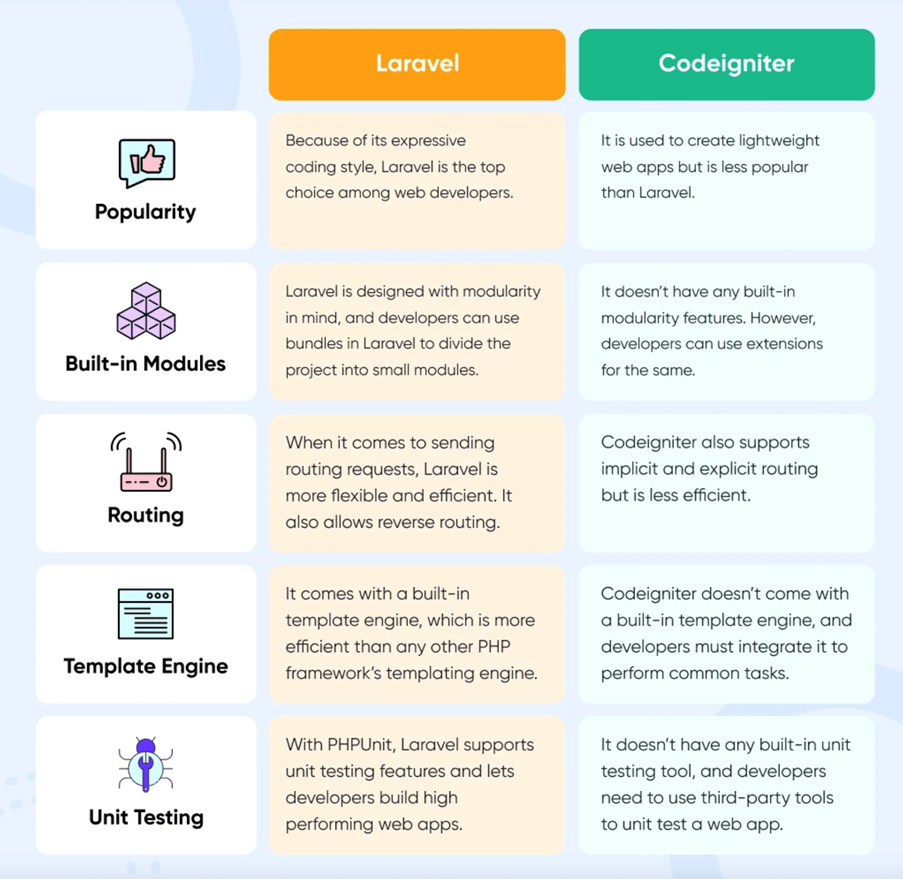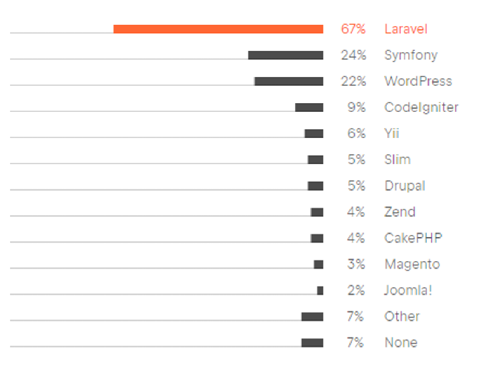Why We Use Laravel for Web Application Development
December 15th, 2023 by Jimmy BuiWhat is the Laravel framework?
Laravel is an open-source PHP framework that offers a wide range of features for web application development. PHP is a programming language used by a very large portion of websites across the globe, including all WordPress websites.
Laravel provides an elegant syntax and a set of tools for common programming tasks, making it easier for developers to build modern web applications. Key features and components of Laravel:
- MVC Architecture Pattern: Laravel follows the Model-View-Controller (MVC) architectural pattern, which helps developers to maintain application code and ensure separation between presentation layers and business logic.
- Blade Templating Engine: Laravel uses the Blade templating engine, which provides a lightweight powerful way to structure dynamic content in views.
- Eloquent ORM (Object-Relational Mapping): Laravel comes with an advanced implementation of the database management tool called Eloquent, which allows developers to interact with the database using an object-oriented syntax.
- Middleware: Laravel uses Middleware to filter HTTP requests entering an application. This can be useful for tasks such as authentication, logging, and more.
- Routing: Laravel makes it easy to define web routes for your application, allowing you to handle HTTP requests with specific controllers and methods.
- Authentication and Authorization: Laravel provides a simple and easy-to-use authentication system out of the box such as login, Registration, and Password Reset.
- Artisan Console: Laravel includes a command-line tool called Artisan, which provides various commands that can assist you while you build your applications.
- Testing: Laravel supports PHPUnit test and provides convenient methods for testing applications.
Overall, Laravel provides a variety of features that make it a popular choice among developers, including an intuitive syntax, built-in features, and community support. It is widely used for building a variety of web applications, from small projects to large enterprise-level applications.
Laravel is not only a PHP framework for server-side programming tasks, but also develops full-stack web applications, supporting frontend tasks as well. Front end development is usually supplemented with Javascript, CSS and HTML.

History of Laravel
Laravel was created by Taylor Otwell and released the first version in 2011. Below is a brief timeline for versions of Laravel from the beginning until now:
- 2011 – Laravel 1
- 2012 – Laravel 2
- 2013 – Laravel 3
- 2013 – Laravel 4
- 2014 – Laravel 5
- 2016 – Laravel 5.3, 5.4, 5.5
- 2017 – Laravel 5.6
- 2018 – Laravel 5.7
- 2019 – Laravel 5.8
- 2020 – Laravel 7 and Laravel 8
- 2022 – Laravel 9
- 2023 – Laravel 10
Laravel has been developing by a focus on expressive syntax, developer experience, and the adoption of modern PHP features. It has become one of the most popular PHP frameworks, known for its ease of use, modern features, and strong community support.
Back to 2011, Codeigniter was the most popular framework used in PHP, but it lacked several essential features such as the authorisation & authentication, a template engine and unit testing. When Taylor Otwell introduced the Laravel framework, it was received as a great alternative to Codeigniter, as explained in the comparison below:

Below are the statistics that show the success of Laravel, in competing with Codeigniter. The statistics are from 2023 showing the percentage of PHP developers using the various frameworks available:

Why Contactpoint chooses Laravel for complex web applications
Popularity on its own, in not enough to choose a framework.
Modern programming generally starts with a framework, to reduce the cost of development and deliver all the benefits that can be gained from the approach. Below are some general factors that should be considered when choosing a framework for your web application:
- The popularity of the framework
- Performance support
- Security
- Testing features
- Database access
- Third-party integrations
- Modularity
- Built-in modules
- Cost of development
- Community support
Like many other frameworks, there are benefits and drawbacks of Laravel in developing web applications.
Laravel Advantages:
- Easy to use with the intuitive interface, elegant syntax, and documentation.
- MVC architecture pattern which helps developers to maintain the code.
- Powerful Blade Templating Engine.
- Easy to include the libraries and integrate with third party tools.
- Built-in features with security and authorisation out-of-the-box.
- Security of web resources.
- Caching for better performance.
- Easy to deploy, scale an application and maintain / enhance an application.
- Strong and wide community support.
- Majority of developers enjoy using it.
Laravel Disadvantages:
- Sometimes it can be difficult to upgrade to a new version, in particular when there is a major new release, which may require significant changes to existing code.
- Frequent updates require attention to regular maintenance.
- Less compatible with modern frontend frameworks such as React JS and Vue JS.
I personally enjoy the following aspects of using Laravel for web application development:
- Installing packages and dependencies can be performed quickly via the command line.
- Building a strong user interface by combining the blade template with HTML & CSS.
- Good structure for model, view and controller (MVC).
- Easy to include the Javascript libraries for a superior user interface.
- Easy to integrate with third parties such as AWS, Google, etc.
- It’s convenient & easy to setup the project on my local machine.
- Debugging backend code can be done quickly.
- Easy to connect to databases such as MySQL and PostgreSQL.
- Provided authentication system.
- Easy to build RESTful APIs.
Contactpoint has built many web applications using the Laravel framework, including most recently the Deaths and Funerals web application.
As you can imagine, utilising pre-existing libraries allows common tasks to be incorporated into a web application in a cost-effective and robust manner. We have utilised many Laravel packages / libraries and other codebases, across the many applications we have built, including:
- aws/aws-sdk-php-laravel package: for AWS services such as sms, email, etc.
- darryldecode/cart package: a shopping cart solution.
- barryvdh/laravel-dompdf: converting html to pdf.
- jQuery – Javascript library: implementing client-side functionality.
- Bootstrap – CSS library: implementing the style across the application.
- Flmngr: PHP file manager for uploading external files.
- TinyMCE – Javascript library for providing a HTML editor applied to web content.
- FullCalendar – Javascript library including booking calendar with day, week, month and year views.
- Date and time picker – Javascript library for users to select a single date and time.
- Date range picker – Javascript library for users to select a range of dates.
When we won’t use Laravel
While Laravel is a powerful and popular PHP framework, there are situations where it may not be the best fit for a particular project. Below are some reasons why Laravel may not be appropriate for a particular web application:
- The project has very simple requirements.
- When only a RESTful API is required, and no other complex functionality, a framework may not be required.
- Where high-end performance is vital.
- Tight budget and time constraints.
- Highly customised or unique architectures.
- Pre-existing technology is using a different framework, or infrastructure to be used does not support Laravel.
If you have an idea for a web application, we look forward to understanding your idea, and helping you to choose the best framework for developing it!







